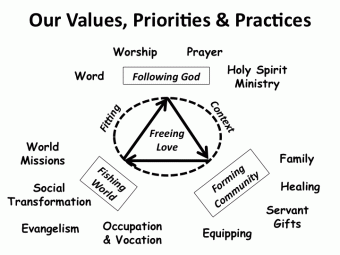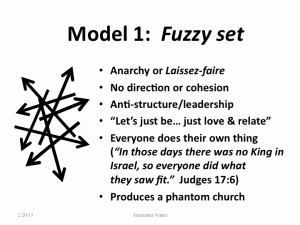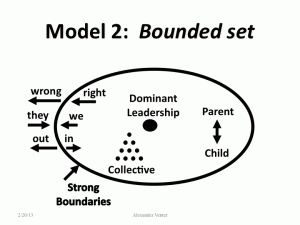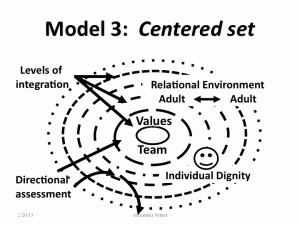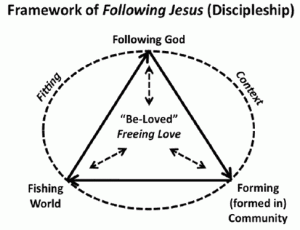SESSION 2: THE EARLY CHURCH AND COMMITTED BELONGING
We looked at following Jesus, which meant joining his community: Following Jesus… in community… for others (one reality in three inseparable values). Jesus told them to “go, make followers…” How did the early church do this? What did belonging in community (‘church membership’) mean in this context?
1. HOW DID JESUS’ FOLLOWERS MAKE FOLLOWERS OF JESUS? (Working from Acts 2:37-47)
1.1. Theologians call it ‘Initiation into Christian (Messianic) faith’.
What did Christian initiation entail?
1.2. Repentance & faith: the moment of conversion, “repentance from dead works and faith toward God” (Heb 6:1f). Jesus preached it as we saw in Mark 1:14-16, and now Peter in Acts 2:38.
1.3. Baptism & laying on of hands: “Be baptized… and you will receive the Holy Spirit” (Acts 2:38). This is the public act of sealing your faith in Messiah, burying your past life, entering new life in his community, and being empowered with the Spirit as Jesus was (Mark 1:9-11 cf. Heb 6:2).
1.4. This was initiation into the local church: Conversion and baptism involved belonging to the local church of Jesus. And this is where discipleship happened – not on your own – see Acts 2:40-42f.
1.5. There’s evidence of an immediate discipleship process or ‘catechism’: The baptismal confession in Galatians 3:38 gave the new followers a new identity in the one Body of Christ, where a ‘foundation of faith’ was laid: Jesus the cornerstone (1Cor 3:10) and his ‘Sermon on the Mount’ (Matthew 5 to 7, an early church catechism), plus the ‘elementary principles’ in Heb 6:1-3. The ‘disciplined learning’ or apprenticeship to Jesus began at conversion and continued till death!
2. WHAT DID ‘CHURCH’ MEAN – WHAT WAS IT’S BIBLICAL UNDERSTANDING?
2.1. Many names/metaphors were used for the first followers/community of Jesus: Here are some…
2.2. ‘The Way’ of Jesus (Gr. Hodos, Acts 9:2 cf. John 14:6… Jesus’ way of living the Kingdom)
2.3. Christians (Kristianos or Messianics, Acts 11:26… Jesus’ disciples were called this by others)
2.4. God’s family & household (patria & oikos, Eph 3:15, 2:19, speaks of relational belonging)
2.5. Fellowship (koinonia, Phil 2:1f, speaks of sharing in a common life – God’s life in community)
2.6. The most common was ‘church’ (Ekklesia, Matt 16:18) – from secular Greek usage, “those called out to gather” to decide the affairs of the town/city. Jesus’ first followers used this word to describe those Jesus calls to gather to him to share in his Kingdom authority to transform the town/city. I.e. ‘church’ is a ‘community happening’ in (because of) God’s ruling presence!
Put another way: Jesus’ ekklesia (his calling to us – our ‘vocation’) is to Follow God, Form (be formed in) Community, to Fish the World for the Kingdom of God.
2.7. We have to get away from ‘church’ = meeting; or ‘church’ = the meeting place (the building).
3. CHURCH – AS GOD’S IDENTIFIABLE COMMUNITY – ‘HAPPENS’ AT VARIOUS LEVELS:
3.1. The way ekklesia is used reveals that it gathers/happens at six ‘levels’ (see diagram below)
3.2. One cannot claim to ‘belong’ at one level (e.g. “I’m part of the universal/invisible Church of Jesus Christ”) without tangible belonging at the levels of local gathering.
3.3. The most basic levels of church belonging is lived out in the two’s and three’s of deep friendship, in relational belonging in house-church (Rom 16) and the local gathered church (Acts 20:20).
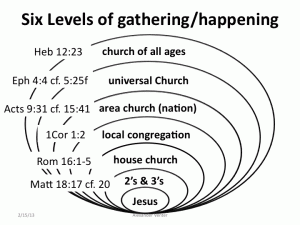
4. WHEN IS A (LOCAL) CHURCH A (TRUE) CHURCH OF JESUS CHRIST? (The Reformer’s ‘Five Marks or Characteristics of the Local Church’ as per the New Testament)
4.1. Where believers gather for fellowship (regular worship, prayer, ministry & mission, Acts 2:42f).
4.2. Where the Word of God is faithfully preached (Acts 2:42; 1Tim 3:15, 4:13, 2Tim 3:14f).
4.3. Where leadership, oversight and discipline are properly constituted (Heb 13:7, 17).
4.4. Where the ordinances (sacraments) of Christ are properly administered (Matt 26:26f, 28:18f), namely believers baptism and the Lord’s Supper (Communion).
4.5. Where the (local) church is recognized by the broader Church.
5. WHAT THEN IS THE EARLY CHURCH IDEA OF BELONGING AND MEMBERSHIP? (Theologians talk about ‘The Tangible Signs of Koinonia’ in the Early Church)
5.1. Faith in Jesus and baptism and laying on of hands – what we call ‘Christian Initiation’ (above). This speaks of a clear point of (formal) commitment to Jesus and his (local) community.
5.2. The common meal (the Lord’s supper): ‘holy communion’, church love feasts (Jude 12), shared meals in homes, etc. This was a tangible sign of a deeper sharing of life or koinonia (‘common life’ or community), sharing material resources as in giving and receiving, seen in Acts 2:42f. Therefore belonging or membership was relational, functional, participatory, specific.
5.3. The ‘right hand of koinonia’ (Gal 2:9): receiving recognition of (local) family belonging
5.4. The ‘kiss of peace’ (Rom 16:16): it’s a ‘holy’ kiss of family… how’s that expressed in our culture?
5.5. Regular gathering together (Acts 2:42 cf. Heb 10:25) at both small group level (home churches) and in public celebrations (congregational level) – see Acts 2:46, 20:20; 1Cor 14:26.
The point of this session was to show that formal commitment and belonging (what we call membership) was present and practiced in the Early Church. How does this translate into our postmodern world and local church – and specifically our church Following Jesus? (Next session)

